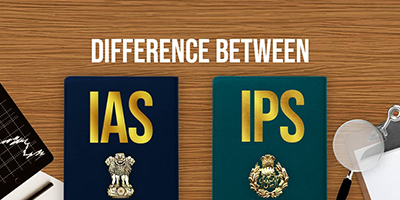




The Union Public Service Commission conducts the Civil Services Examination once every year to recruit officers to various posts in 24 services. These services are categorized into 2 All India Services, IFS, 16 Group-A Central Services and 5 Group-B Central Services. Among the services, IAS and IPS undoubtedly grab the major attention. It is often seen that many aspirants weigh IAS vs IPS and feel unsure about which one to go for!
Indian Administrative Services or IAS is one of the 3 All India Services. The other two are the Indian Police Service (IPS) and the Indian Forest Service (IFS).
In the subsequent sections, we will discuss in detail the differences between IAS and IPS. But let’s first understand the factors that differ in both services quickly:
All discussions regarding IAS vs IPS emanate from these distinguishing characteristics.
Individuals appointed in the Indian Administrative Service (IAS) hold key positions in the country's administration at the central and state levels.
So, regarding the discussion on IAS vs IPS roles, Indian Administrative Service officers have a wider area of responsibilities compared to police officers.
The career progress in the Indian Administrative Service is entirely different from the Indian Police Service. IAS officers can be posted in the Central Secretariat, State Secretariat or District Administrations. Similarly, IPS officers can get postings under central or state administration. Actual ranks vary depending on the designation.
Let’s understand the ranks and career progression of IAS and IPS officers under district and state-level administration from the below IAS vs IPS ranking table.
|
IAS Ranks |
Minimum years in services to become eligible for promotion |
IPS Ranks |
Minimum years in services to become eligible for promotion |
|
Sub-Divisional Magistrate |
4 |
Assistant Superintendent of Police (ASP) |
5 |
|
Additional District Magistrate |
8 |
Deputy Superintendent of Police (Dy. SP) |
10 |
|
District Magistrate |
12 to 16 |
Superintendent of Police (SP) |
12 |
|
Divisional Commissioner (equivalent to Additional Secretary / Principal Secretary) |
24 to 30 |
Senior Superintendent of Police (SSP) |
13 |
|
Additional Chief Secretary |
30 to 33 |
Deputy Inspector General of Police (DIG) |
15 |
|
Chief Secretary |
34 to 36 |
Inspector-General of Police (IG) |
19 |
|
Cabinet Secretary of India |
Over 37 |
Additional Director General Of Police (ADG) |
22 |
|
|
|
Director General of Police (DGP) |
25 |
So, when checking the IAS vs IPS career progression possibilities, IAS officers have higher opportunities for advancing in their ranks compared to IPS officers.
At the entry level, both IAS and IPS officers get equal remuneration as per Junior Pay Level 10. The minimum salary at this level begins at ₹56,100 and can go up to ₹1,32,100 per month as per seniority. Beyond this level, remuneration for IAS and IPS officers starts taking slightly different routes. Let’s check the IAS vs IPS salary for higher designations.
IAS officers get slightly better remuneration. However, IPS officers are entitled to various special duty allowances, which can increase their salary.
Coming to the discussions on IAS vs IPS training, the training curriculum for newly recruited IAS officers differs from their IPS counterparts.
All the services under UPSC CS are equally prestigious and essential for the effective functioning of Indian democracy. You do not need to choose your preferred services while appearing for UPSC Prelims and Mains. It is necessary only when you qualify for the interview.
So, have you started your UPSC preparations? Take subject-wise Demo Tests and Prelims Test Series to understand your level of readiness for the examination.
© 2025 iasgyan. All right reserved